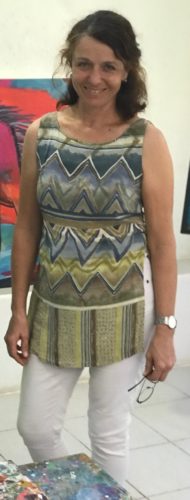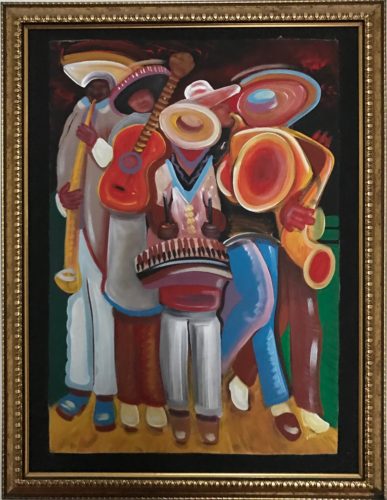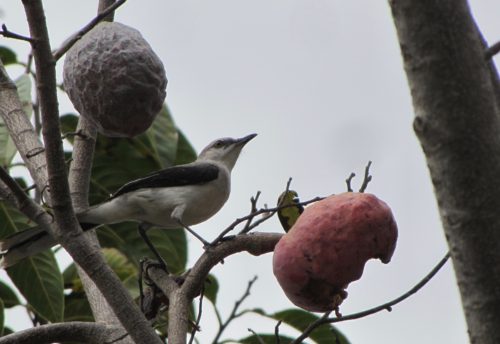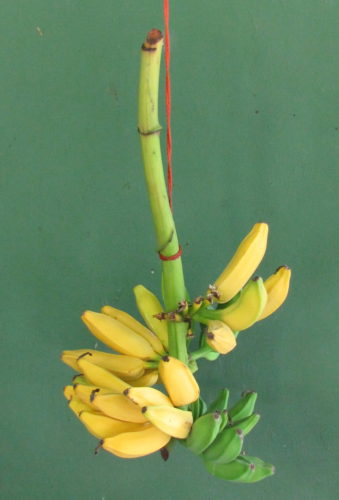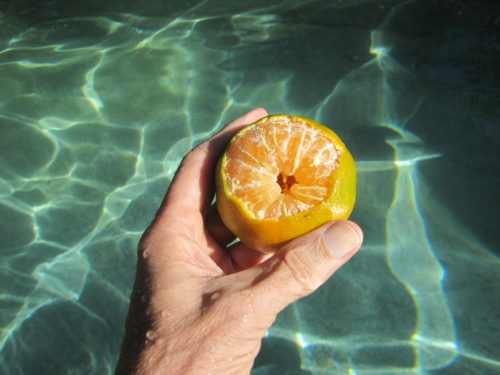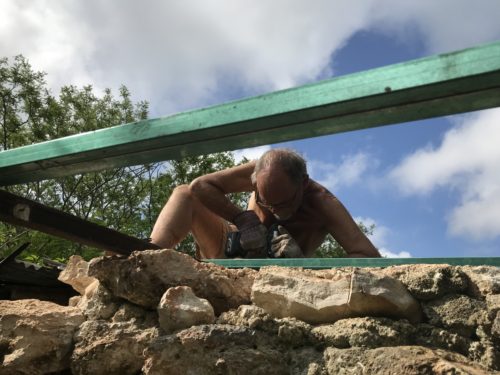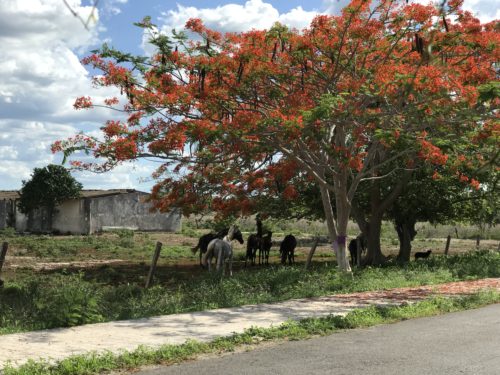
ORIGINAL INNOCENCE. Adam & Eve © 2019, MeridaGOround
I love good stories. Surely we all have some familiarity with this one. It comes from the First Book of Moses, titled Beginnings, perhaps known more widely as Genesis. (Moses wasn’t actually the author, but he gets the royalties for writing down this oral history – although even this detail is dubious.) My point is that facts and stories are often at odds.
This short story has entered public consciousness, but with much accumulated baggage which simply isn’t there : concepts such as sin, fall, apple, satan. So, where did they come from, and how did they insinuate themselves into our story, and our thinking? ¿Maybe that hulking clownish presence in the upper right of the image whispered them into our ears? In the original language, a serpent is known as nacash, whisperer. We can almost hear it hissiing, pssst, this story is gaming you.
No, don’t run away! Like Moses, you need courage to handle the serpent, wisely. (Don’t grab him by the tail (tale?) or he could turn and bite you. If you’re still convinced that those terms, sin-fall-apple-satan are in the story somewhere, you’ve already been bitten. Have a look for yourself, using the pulldown menu presently set at “KJV” — choosing whichever version you prefer, as I’m unaware of any translation that includes them. (The story is very short.) I’m not trying to charm you, but merely awaken you from a bad religious or cultural dream.
There’s a point to this story of the garden. I won’t presume to tell you what it is, but will ask you to think along with my four-year-old self. As I watched my Mom preparing meals, she would often tell me “don’t touch the hot stove.” Why does she keep telling me this? – I wondered. So one day, after she had turned off the flame, and turned her back, I put my index finger on the blackened metal grate. Yeow! – I cried, and beheld a blister forming instantly. And, of course, she said I told you not to do that, silly! But, here’s the thing : she did not kick me out of the house for disobedience, nor curse me with a death sentence. Yet this is exactly what our story tells us that our Divine Parent did when the first couple disobeyed. Is rigid, uncurious obedience the point of the garden story? I think not.
A delightful account of the history behind this story can be found in a book by Harvard’s Stephen Greenblatt, titled The Rise and Fall of Adam and Eve. (I’ve linked a 4-star review by an Amazon Vine Voice, a Doctor Moss; Kindle: $8.30, for those who want more of the details.)
For me, the contest between innocence and sin comes when Bishop Augustine and Pelagius (a saintly British monk) disagreed over doctrine, Pelagius arguing on behalf of innocence. Well, Augustine, being a powerful church politician, won, and Pelagius’s letters were burned, and he was declared a heretic (see pp. 104+, of Greenblatt). And the world got celibacy and pedophilia. Life might be dull without some drama, which I suppose can be a problem with nonduality (also called monism). But I digress.
No apple! Nor was sex the problem in our story. Sex is natural, and innocent, when balanced. No marriage, either. Back then, and for many, many centuries beyond, we simply got into the same tent together one night, and emerged in the morning as a couple. Everybody in camp knew that we were now a couple, with major responsibilities for each other, and to the human family, the community. Absence of ceremony didn’t lessen the seriousness, but may have kept the cost of formalities in check <wink>. (But note that the state will declare you married by “common law” eventually, and it will divide “the stuff” of your relationship.) ¿ Best to catch up with modern times by being real?
ASIDE. There’s a new nonfiction book coming July 9th, titled Three Women, which may do a lot of whispering, based on my reading of a review with excerpt. I’ve not read the book, and probably won’t. (It could be this year’s 50-Shades, also not read by me, but as nonfiction.) The new book claims not to be about sex, but rather about desire. Yet it seems to be selling drama and sex. And it seems it will do much whispering. Be alert. If you enter the story you may burn your finger, or worse. You might do better reading an ancient stoic, Epictetus, his Discourses, (online, or from a library) who writes about desire and aversion in a balanced and undramatic way, with short essays which will focus the mind on these topics, painlessly.
As Pelagius argued, Adam and Eve probably would have died a natural death, anyway. And my last shot is simply this. When we die, we get to export only the lessons we’ve learned. (I hope I’ll avoid touching a hot stove again. Curiosity has other tools beyond the senses, intuition being among them.)
Note: the photo above, shot in my backyard here in Mérida, is copyrighted by me, “MeridaGOround”. Contact me thru the comment section of this site to discuss usage. But be sure NOT to include any links in your message, as my spam trap is very sensitive. So, include a “broken” email address after the @ (adding a space, which I will then mend) and I will reply to you. Please include your real name in the comment, so I can verify that you are not a spammer. Also, I plan to print a small, fine art run of archival prints done on rag paper, with chromogenic inks.


